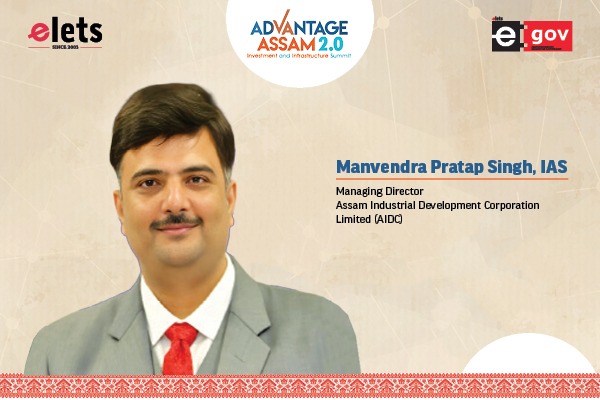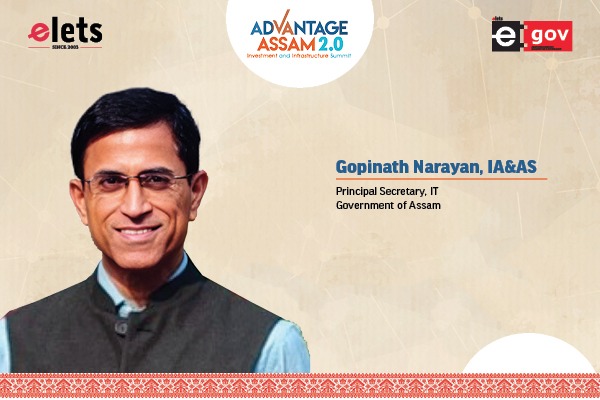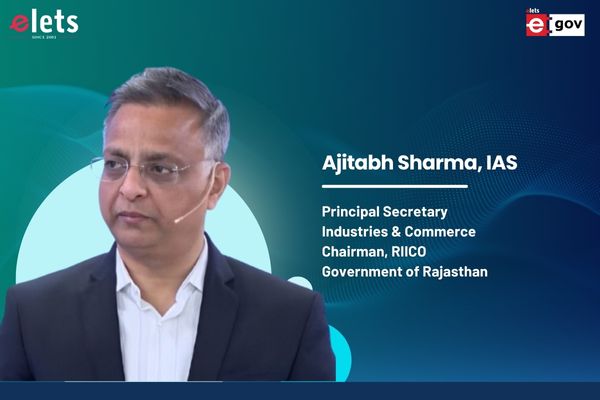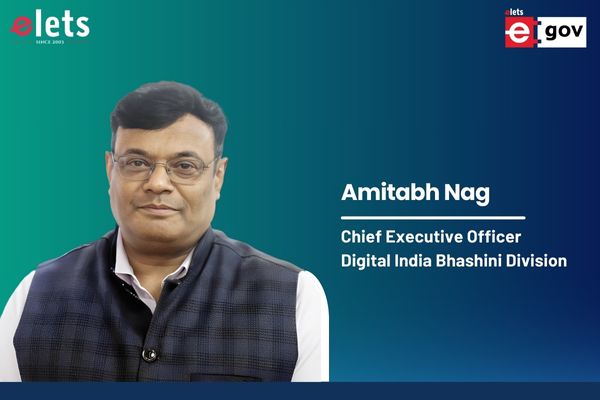
Karnataka has long been at the forefront of India’s technology and innovation journey, shaping the nation’s digital, electronics, and biotech landscapes. Now, as the state gears up for its next big leap, it is driving forward with a bold vision, transformative policies, and strategic initiatives to cement its leadership in these sectors. In an exclusive conversation Darshan H.V., IAS, Director, Department of Electronics, Information Technology & Biotechnology, Government of Karnataka, shared insights with Elets News Network (ENN) into how the state is fostering innovation, attracting investments, and preparing for a future defined by cutting-edge advancements.
Karnataka has long been a torchbearer of India’s technology and innovation journey. What’s the next big leap the state is aiming for in the Electronics, IT, and Biotechnology sectors?

Electronics sector

Karnataka is widely recognized as the birthplace of innovation, information technology, research and development, and manufacturing in India, and today, it stands as the nation’s most innovative state. It is home to numerous global engineering hubs, nearly 500 R&D centres, and around 100 chip design centres.

Karnataka’s growth in the Electronics System Design and Manufacturing (ESDM) sector has been driven by companies that have aligned with the government’s proactive policies.

To foster innovation and R&D across various electronics sub-sectors, the state has established multiple Centers of Excellence (CoEs) in fields such as aerospace and defence, cybersecurity, animation and gaming, artificial intelligence, IoT, and robotics. Additionally, the Government of Karnataka has launched the Elevate program, providing startups with grants of up to INR 50 lakh, along with incubation support, industry mentorship, incentives, and venture capital connections to further drive technological advancement.
IT Sector
Karnataka has been a pioneer in India’s IT revolution, establishing itself as a global technology hub and driving innovation and digital transformation. Bengaluru, in particular, hosts over 80% of global IT companies operating in India. The state contributes nearly 40% of India’s IT exports. To foster the next wave of IT growth, the government is focusing on emerging technologies like AI, blockchain, cloud computing, cybersecurity, and quantum computing. Efforts to decentralize IT growth have led to the launch of the Karnataka Digital Economy Mission (KDEM) and the Beyond Bengaluru initiative, promoting development in cities like Mysuru, Hubballi, and Mangaluru. Under the IT Policy 2020-25, Karnataka aims to attract ₹10,000 crore in investments and generate 60 lakh jobs, with a strong emphasis on fintech, agritech, and health tech.
Biotechnology Sector
Karnataka is India’s largest biotechnology hub, housing over 1,054 biotech startups and accounting for more than 60% of the country’s biotech companies. It plays a pivotal role in research, development, and biomanufacturing, with Bengaluru recognized as India’s Biotech Capital. Karnataka has fostered a strong biotech startup ecosystem, supported by many government initiatives. The Karnataka Innovation and Technology Society (KITS), in collaboration with global biotech leaders, is advancing gene therapy, vaccine development, and precision medicine. With biotech parks like Bengaluru Helix Biotech Park, the state continues to strengthen its position as a global leader in biosciences and life sciences research.
Through these strategic initiatives, Karnataka continues to drive technological advancements in electronics, IT, and biotechnology, ensuring its position as a global innovation powerhouse.
The Karnataka Startup Policy has been a game-changer. Are there any upcoming policy changes or new initiatives designed to make the state even more investment-friendly?
Karnataka has been actively enhancing its investment climate through various policy initiatives. During the Bengaluru Tech Summit 2024, the Department facilitated an Investor Connect Program to help start-ups establish strategic partnerships, enabling collaborative projects, joint ventures, and other growth opportunities. Over 200 start-ups, primarily from the ideation, concept validation, and early traction stages, pitched their ideas to 120 unique investors, with a strong emphasis on growth-stage ventures. The Department plans to continue organizing such initiatives in the future.
To attract global investments and foster collaboration in technology and innovation, the Department of Electronics, IT, Bt, Government of Karnataka conducted international roadshows across the US, UK, Dubai, France, Switzerland, and Germany ahead of the summit. Additionally, the Department has initiated the development of “Global Innovation Alliances” with over 30 innovation hubs worldwide.
INNOVERSE: A bold new initiative aimed at fostering deep-tech innovation through a dedicated innovation campus. Designed to nurture emerging technologies such as artificial intelligence, machine learning, cybersecurity, and IoT, this facility will facilitate cross-sectoral collaborations by bringing together startups, corporations, and academia. It seeks to address global challenges in areas like space, rural commerce, and climate technology while creating a thriving innovation ecosystem akin to leading global hubs. INNOVERSE will further strengthen Karnataka’s position as a powerhouse for emerging technologies and a beacon of visionary collaboration.
Programmes like Rajiv Gandhi Entrepreneurship Program (RGEP), WEscalate, New Age Innovation Network (NAIN) etc., has further strengthened the startup ecosystem in the state.
The “Beyond Bengaluru” initiative aims to decentralize IT & BT growth. What progress has been made so far, and what can investors expect in emerging hubs like Mysuru, Hubballi, and Mangaluru?
The Beyond Bengaluru initiative, led by the Government of Karnataka and KDEM, is driving the decentralization of IT and BT growth by fostering emerging tech clusters in Mysuru, Hubballi-Dharwad-Belagavi, Mangaluru, and Kalaburagi. With strategic policy support, infrastructure development, and industry collaboration, these regions have witnessed significant progress, including the expansion of Global Capability Centers (GCCs), increased startup activity, and the establishment of Global Technology Centers (GTCs) in Mysuru. Similar initiatives are being proposed for Mangaluru and the Hubballi-Dharwad-Belagavi cluster to further boost innovation.
Beyond Bengaluru is strengthening Karnataka’s emerging tech hubs through a cluster-based approach. The Government of Karnataka and the Department of E, IT & BT have been proactive in decentralizing the sector, making Mysuru, Hubballi, and Mangaluru focal points for tech-driven growth. These efforts are expected to attract increased investments from tech-based industries, solidifying Karnataka’s position as a dynamic innovation hub.
Mysuru
Mysuru is rapidly emerging as a prominent cybersecurity cluster, excelling in research, development, and innovation. It hosts a thriving ecosystem that attracts cybersecurity companies and professionals while fostering a culture of knowledge exchange and collaboration. The city offers robust infrastructure, including 1,00,000 sq. ft. of plug-and-play space and over 350 co-working spaces. Additionally, the Global Technology Centre in Mandakalli spans 2,00,000 sq. ft. across 10 acres, featuring modern amenities, with 1.5 acres dedicated to IT companies and startups.
Investors have access to land in the Kochanahalli Industrial Area, which covers 235.55 acres in Mysuru district, Karnataka. The area is well-connected by National Highways, railway lines and airport. The presence of Mangaluru airport adds strategic advantage to Mysuru city
Mysuru also boasts a strong educational infrastructure, with over 15 renowned engineering colleges and a talent pool of approximately 30,000 IT professionals. Furthermore, the city supports innovation through many incubators and accelerators.
Hubballi-Dharwad
The Hubli-Dharwad region in northern Karnataka is emerging as a hub for the consumer electronics ecosystem, attracting companies working on this sector.
The region boasts approximately 5,00,000 sq. ft of shared infrastructure, including bare shell and plug-and-play spaces, along with 400+ co-working facilities. Investors can benefit from the approved EMC cluster at Kotur-Belur Industrial Area in Dharwad District, spanning around 225 acres. The area is well-connected by National Highway, railway lines and airport.
The Hubballi-Dharwad region is also a strong educational hub, featuring over 20 renowned engineering colleges and a skilled IT workforce of approximately 12,000. Institutions such as IIT-Dharwad, IIIT-Dharwad etc., contribute significantly to the talent pool. To foster entrepreneurship, the region houses several incubators covering various sectors.
Mangaluru
Mangaluru has emerged as a dynamic fintech hub, driving innovation and digital transformation in financial services. It provides a conducive environment for fintech startups, fostering entrepreneurship and promoting financial inclusion and digital banking solutions. The region boasts 3,35,000 sq. ft of Plug & Play infrastructure and over 500 co-working spaces, supporting business growth. Its expanding supply chain includes major companies like Infosys, Cognizant, Semnox, BASF, and ONGC. With over 20 renowned engineering colleges and a skilled IT workforce of approximately 12,000 professionals, Mangaluru offers a strong educational infrastructure.
What support is the government providing to startups and global businesses in Tier 2 and Tier 3 cities to ensure they thrive?
The Karnataka government has launched several initiatives to support startups and global businesses in Tier 2 and Tier 3 cities, fostering innovation and economic growth beyond Bengaluru. Under the New Age Innovation Network (NAIN) scheme in the state’s recent startup policy, 50 new NAIN centres will be established in higher education institutions outside Bengaluru Urban District, prioritizing government engineering colleges. Of these, 35 will focus on IT/Electronics and 15 on Biotechnology. To further encourage research activities, the government is promoting Technology Business Incubators (TBIs) to help startups transition from ideation to proof of concept. Currently, Karnataka has four TBIs specializing in Medtech, AI & Robotics, Nano Science & Engineering, and Product Development & Management. The startup policy aims to establish six more TBIs in IT/Electronics and three in Biotechnology, with ₹10 crore in funding over five years, strengthening the link between R&D and commercialization.
The ‘Beyond Bengaluru’ initiative recognizes the potential of cities like Mysuru, Hubballi-Dharwad, and Mangaluru, promoting them as emerging startup hubs through infrastructure development, policy support, and industry-academia collaboration. A cluster-led approach has been adopted to develop six startup clusters, starting with three, leveraging regional strengths in physical and social infrastructure. The Karnataka Digital Economy Mission has been established to drive this agenda, focusing on Mysuru, Hubballi-Dharwad, and Mangaluru.
Businesses can expect good talent pool, increased policy incentives and subsidies, better health facilities, high quality education system etc., in these emerging clusters.
The state has attracted significant global investments in the technology domain. Can you highlight the key policies or incentives that have been pivotal in making Karnataka the preferred investment destination?
Karnataka has emerged as a premier global investment destination in technology, driven by progressive policies, strategic incentives, and a strong commitment to innovation. The state’s robust digital infrastructure and industry-friendly policies, including the Startup Policy, Cybersecurity Policy, GCC (Global Capability Centers) Policy, IT Policy, Data Center Policy, AVGC Policy and Biotech Policy, reinforce its position as India’s technology and innovation powerhouse. This dynamic ecosystem, supported by world-class talent and proactive governance, makes Karnataka a preferred choice for global technology investments.
In the electronics manufacturing sector, Karnataka has fostered growth through targeted incentives. The Special Incentives Scheme for ESDM Sector (2020-2025) recognizes Semiconductor Design and Manufacturing as a priority area, offering benefits such as a 25% capital subsidy on land, 20% capital subsidy on plant and machinery, and reimbursements on stamp duty, registration charges, and power tariffs. Additional incentives include production-linked benefits (1% of net annual turnover) and exemptions from electricity duty. Complementing this, the ongoing Karnataka ESDM (KESDM) Policy since 2017 has provided support through patent registration incentives, R&D grants, prototyping cost reimbursements,interest subsidies etc., for startups and medium sized companies.
The state has also introduced the Global Capability Centers (GCC) Policy (2024-2029) to establish 500 new GCCs by 2029, creating 3.5 lakh jobs and generating $50 billion in economic output. Additionally, the draft Space Tech Policy (2024-2029) focuses on the entire space value chain, including commercial, defence, and research sectors. It envisions setting up space manufacturing clusters, establishing testing facilities through public-private partnerships, and providing common access to these facilities for private and public sector players.
The Startup Policy (2022-2027) aims to position Karnataka as a ‘Champion State’ for startups, supporting high-growth ventures with a ₹100 crore venture capital fund for startups working on emerging technologies, and grants up to ₹50 lakh under the Elevate Idea2PoC scheme. The Cybersecurity Policy (2024) strengthens digital security infrastructure in the state.
Karnataka is home to 500+ GCCs, contributing 35% of India’s GCC workforce, with plans to attract 25% of all new GCCs by 2030. The state is targeting 100,000 digitally certified professionals by 2025. Recognizing the need for digital infrastructure, the Data Center Policy offers incentives on power tariffs, land acquisition, and regulatory simplifications while promoting sustainable, energy-efficient data centres.
As a biotech leader contributing nearly 60% of India’s biotech revenues, Karnataka’s Biotech Policy fosters R&D, biotech clusters, research parks, and global collaborations in healthcare innovation.
With incentives for job creation, women’s employment, and sustainability initiatives, Karnataka is strategically positioning itself to become a $1 trillion economy by the end of the decade.
Karnataka’s Electronic System Design & Manufacturing (ESDM) sector is rapidly growing. What strategic vision does the government have for strengthening India’s semiconductor and electronics manufacturing capabilities?
Karnataka’s strategy to promote R&D, innovation, and manufacturing in the electronics and semiconductor sector revolves around three key focus areas: Liquidity, Land, and Labour.
To ensure a conducive policy ecosystem, Karnataka provides liquidity to companies through various incentives. The state introduced the Special Incentives Scheme for the ESDM sector in 2020 for five years and offers special packages for higher investments. Additionally, the Karnataka Space Technology Policy 2024-2029 aims to position the state as a global leader in space technology by fostering space manufacturing, skill development, startups, and MSMEs. The GCC Policy 2024- 2029 has also been launched to establish new Global Capability Centers (GCCs) and generate employment opportunities.
For land and infrastructure, Karnataka has developed specialized industrial clusters for electronics and semiconductor manufacturing. Mysuru focuses on aerospace, defence, and PCB manufacturing, while the Hubli-Dharwad cluster specializes in consumer electronics. Chikkaballapur is dedicated to mobile phone component manufacturing, and areas near Bengaluru are being developed for mobile phone assembly and EV manufacturing. To further boost investments, Karnataka is developing KochanahalliIndustrial Area in Mysuru and the Kotur-Belur Industrial Area in Dharwad under the Government of India’s Modified Electronics Manufacturing Cluster (EMC 2.0) Scheme.
Also Read | Karnataka’s Vision for Industrial Growth and Startup Innovation
In workforce development, Karnataka has a robust educational infrastructure with 235 engineering colleges, 325 polytechnics, and 1,777 Industrial Training Institutes (ITIs), along with premier institutes like IIM Bangalore, IISc, and IIITs. Karnataka has also introduced the Nipuna Karnataka program to enhance workforce skills and employability. Around 30 Government Tool Rooms and Training Centers (GTTCs) provide specialized training in electronics circuit design, industrial automation, VLSI design, embedded systems, and PCB fabrication, with Centers of Excellence set up in partnership with private players. Additionally, the Semiconductor Fabless Accelerator Lab (SFAL), established in collaboration with IESA, provides R&D infrastructure to Indian fabless semiconductor firms, enabling product design and development.
Concluding remarks:
With a strong focus on sustainability, digital transformation, and next-generation technologies, this is an opportune time to invest in Karnataka. Government of Karnataka has always been a pro innovation and business friendly government. Initiatives under the Karnataka Startup Policy 2022-2027 and the Beyond Bengaluru program aim to drive growth in Tier 2 and Tier 3 cities, creating opportunities across the state. Karnataka looks forward to partnerships that shape a future driven by innovation, inclusivity, and sustainability, ensuring holistic growth across all regions.
Be a part of Elets Collaborative Initiatives. Join Us for Upcoming Events and explore business opportunities. Like us on Facebook , connect with us on LinkedIn and follow us on Twitter, Instagram.
"Exciting news! Elets technomedia is now on WhatsApp Channels Subscribe today by clicking the link and stay updated with the latest insights!" Click here!













